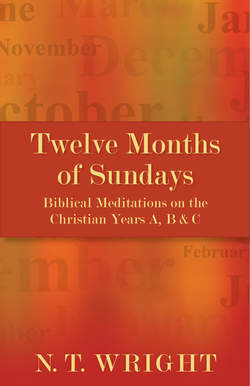Читать книгу Twelve Months of Sundays - N.T. Wright - Страница 30
На сайте Литреса книга снята с продажи.
ОглавлениеThe Third Sunday of Lent
Exodus 17.1–7
Romans 5.1–11
John 4.5–42
John’s great sprawling story (what an excellent move to have some of Jesus’ Johannine encounters in full during Lent) offers food for thought at every level. The antipathy between Jews and Samaritans was not just a cold standoff: then as now, if you travelled through Samaria from the Dead Sea region to Galilee, you could expect trouble. Josephus tells of violent riots, a few years after Jesus’ time, when Jewish pilgrims tried to make the journey. Try telling someone in the Middle East today that, while ‘salvation is from the Jews’, in God’s design there will be no such thing as a holy mountain. That’s fighting talk.
The dialogue is a long string of double meanings and misunderstandings (did John actually intend it, perhaps, to sound funny, a semi-comic scene with a serious point hidden among the to-and-fro of the repartee, like some of Shakespeare’s clown scenes?). Jesus offers living water (the regular phrase for ‘running water’, as opposed to still or stagnant), and the woman reminds him he hasn’t got a bucket. Is Jesus greater than Jacob, the original giver of the well (notice the ‘our father Jacob’, and the long memory of water rights – again, today, a sore point in the same region)? She can’t, of course, cite Exodus, since the Jews claim that as their text – but there, too, water is all-important, and a cause of strife between the wilderness people, their leader, and their God. When Jesus responds with the promise of a water that slakes thirst for ever, she is suddenly submissive. She probably doesn’t know what it is he is really offering (did she think he was making advances?), but she wants it.
As in his response to the rich young ruler, Jesus puts his finger on the point where her life is most sorely in need of living water. Repartee again: ‘Call your husband.’ ‘Haven’t got one.’ ‘No – five down, one to go.’ Oops, change the subject… ‘Are you a prophet by any chance? We have this thing about which mountain we should worship on.’ (‘Oh, you’re from that church, are you? My granny said we should go to this one.’ Always a good distraction.) Objection overruled. ‘Spirit, not mountain, is what matters; and the one God is looking for Spirit-people right now.’ ‘Oh, very interesting – of course one day the Messiah is coming. He’ll explain all that complicated stuff.’ Phew. Let’s not get too far with this.
Pause. No way off the hook. Jesus holds her gaze. Ego eimi, ho lalon soi: ‘I am, who am speaking to you.’ Messiah, and … ‘I am’? End of repartee. Time for action. Sower and reaper are about to rejoice together.
The extension of Jesus’ ministry to the Samaritans, even during his lifetime, is a foretaste of that full extension which Paul celebrates throughout Romans. The Messiah’s death demonstrates the love of God, undercutting all regional or ethnic claims and boasts, and creating a new people, Spirit-people, worship-people.
